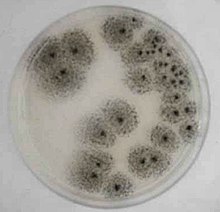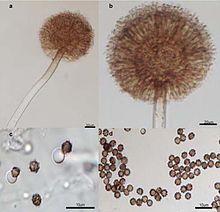Aspergillus awamori
| Aspergillus awamori | |
|---|---|

| |
| A. awamori grown on citrus pectin agar | |

| |
| Photomicrographs of conidiophores (top) and conidia (bottom) | |
| Scientific classification | |
| Domain: | Eukaryota |
| Kingdom: | Fungi |
| Division: | Ascomycota |
| Class: | Eurotiomycetes |
| Order: | Eurotiales |
| Family: | Aspergillaceae |
| Genus: | Aspergillus |
| Species: | A. awamori
|
| Binomial name | |
| Aspergillus awamori Nakaz.
| |
| Synonyms[1] | |
|
List
| |
Aspergillus awamori is the scientific name for what, until about 2013, was considered a type of black Aspergillus (black kōji) used to make awamori and shōchū. Due to international research in 2013, the black kōji used to make awamori and shōchū is now commonly referred to by the scientific name Aspergillus luchuensis.[2][3]
The scientific name and classification of black Aspergillus (black kōji) has been in a state of confusion for more than 100 years since 1901, when the kōji used in awamori was first described as Aspergillus luchuensis. In 2013, many scientists, including Yamada from Japan, Hong from South Korea, Samson from the Netherlands, and others, confirmed that black kōji is an independent species, different from Aspergillus niger, and should be called Aspergillus luchuensis as a matter of priority.[2][3]
According to Yamada, the biggest cause of confusion over the scientific name of black kōji is that NRRL 4948, which is considered the neotype of A. niger var. awamori (=A. awamori), is a strain similar to A. niger from Brazil, which has nothing to do with awamori. In other words, the strains previously classified as A. awamori include not only A. luchuensis but also A. niger. Therefore, the scientific name A. awamori was "doubtable" and the scientists suggested that it was better not to use this name to avoid taxonomic confusion. According to him, as of 2015, the internationally accepted scientific name for black kōji seems to be A. luchuensis, after the historical name for Okinawa Island, "Ryukyu".[2][3]
See also
[edit]- Aspergillus luchuensis - also known as Aspergillus awamori var. kawachi[4]
References
[edit]- ^ "Aspergillus awamori Nakaz". Global Biodiversity Information Facility. Retrieved 23 April 2024.
- ^ a b c Osamu Yamada. 黒麹菌の学名がAspergillus luchuensisになりました (The scientific name for black koji is now Aspergillus luchuensis.) (in Japanese). Japan Science and Technology Agency. Archived from the original on 19 December 2022. Retrieved 9 April 2023.
- ^ a b c Hong, S. B.; Lee, M.; Kim, D. H.; Varga, J.; Frisvad, J. C.; Perrone, G.; Gomi, K.; Yamada, O.; Machida, M.; Houbraken, J.; Samson, R. A. (28 May 2013). "Aspergillus luchuensis, an industrially important black Aspergillus in East Asia". PLOS ONE. 8 (5). United States National Library of Medicine: e63769. doi:10.1371/journal.pone.0063769. PMC 3665839. PMID 23723998.
- ^ "Aspergillus luchuensis". National Center for Biotechnology Information.
